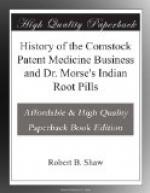The same episode was also mentioned in the Express, the Commercial Advertiser, and the Tribune. In fact, a spirited debate in the “affair of the letters” was carried on in the pages of the press for a week. The brothers defended themselves in the following notice printed in the Morning Express for May 31:
Obtaining letters
Painful as it is, we are again compelled to appear before the public in defense of our character as citizens and business men. The two letters referred to by L.S. Comstock (one of which contained One Dollar only) were both directed “Comstock & Co.” which letters we claim; and we repeat what we have before said, and what we shall prove that no letter or letters from any source directed to L.S. Comstock or Lucius S. Comstock have been taken or obtained by either of us or any one in our employ.
The public can judge whether a sense of “duty to the Post Office Department and the community”, induced our brother to make this charge against us (which if proved would consign us to the Penitentiary) and under the pretence of searching for letters, which perhaps never existed; to send Police Officers to invade not only our store, but our dwelling house, where not even the presence of our aged Mother could protect from intrusion. These are the means by which he has put himself
[Footnote 3: Receipts for these registrations were signed by the prominent librarian, Charles Coffin Jewett, later to be superintendent of the Boston Public Library for many years.]
[Illustration: Figure 2.—Wrapper for Oldridge’s Balm of Columbia, Comstock & Co., druggists.]
in possession of the
names of our customers; of our
correspondence;
and our private and business papers.
J.C. & GEO. WELLS COMSTOCK,
firm of Comstock & Brother, No. 9 John
Street
Lucius, for his part, never deigned to recognize his opponents as brothers but merely described them as “two young men who claim relationship to me.”
It was the position of J. Carlton and George that as they, equally with Lucius, were heirs of the dissolved firm of Comstock & Co. Brothers, they had as much right as Lucius to receive and open letters so addressed. Moreover, since the predecessor firm of Comstock & Co. had never been dissolved, J. Carlton also shared in any rights, claims, or property of this firm. In a more personal vein, the brothers also asserted in their brief that Lucius “is not on speaking terms with his aged mother nor any one of his brothers or sisters, Nephews or Nieces, or even of his Uncles or Aunts, embracing quite a large circle all of whom have been estranged from him, either by personal difficulties with him, or his improper conduct towards his brothers.” Lucius, in turn, had copies of his charges against his brothers, together with aspersions against their character and their medicines, printed as circulars and widely distributed to all present or former customers in the United States and Canada.




